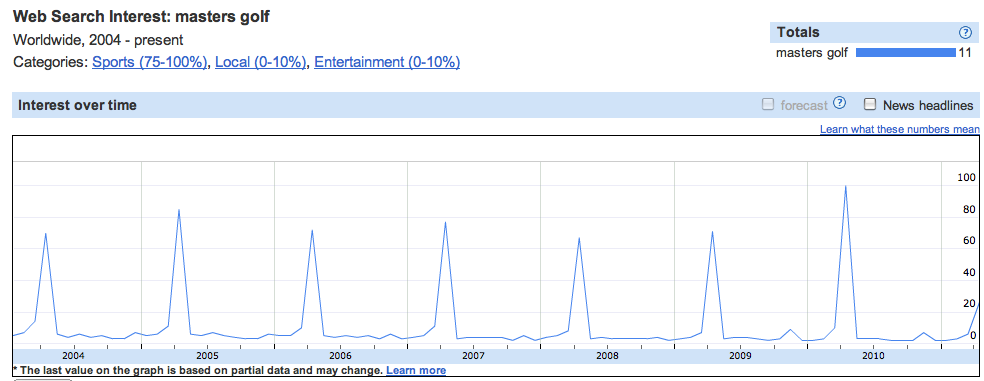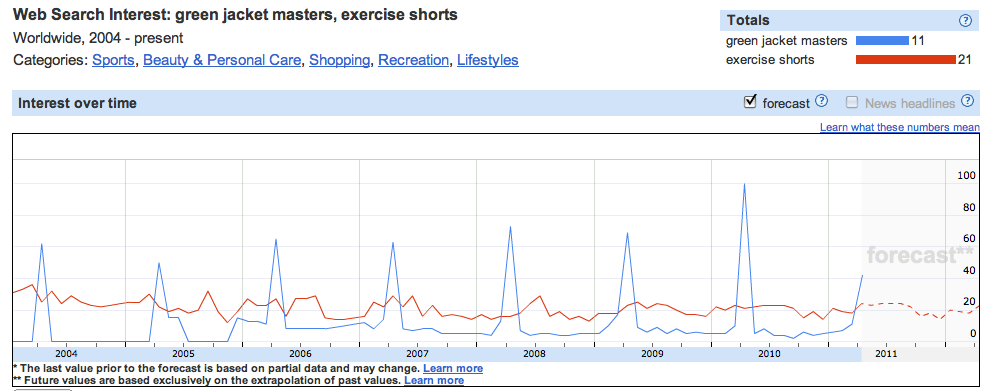Official Google Blog |
| Posted: 07 Apr 2011 04:00 PM PDT For golf enthusiasts like me, a trip to Augusta, Ga. in early April is as close as one can get to golf nirvana. The excitement begins the moment you drive down [magnolia lane] and approach the [augusta national] Clubhouse. In fact, there's probably no golf event that captures the world's attention quite like The Masters does every spring. The Masters is unique among golf tournaments since it's held in the same location each year, and after 75 years the rituals and legends have taken on a life of their own. The competitors teed off today in the opening round, so we thought it would be a good time to take a look at what people have searched for on Google about the tournament, the players and the traditions. With a relatively small field of 93 professionals and six amateurs hailing from 22 countries, The Masters is a global event that draws interest from all over the world. We can see that each year, worldwide searches for [masters golf] peak the weekend of the tournament. The chart below shows how the trend is set to take off again this year and will likely hit its peak over the weekend. The winner of The Masters gets to walk away with a unique prize: the prestigious green jacket—given to the lowest score in the tournament—and the game's defining garment. Every April, The Masters [green jacket] becomes one of the most sought-after article of clothing on the web as searchers turn to Google to discover the history of the jacket, seek out past winners and learn the protocols for receiving and wearing the special sport coat. Searches for [green jacket masters] have grown every year since 2004, with the highest mark occurring last year. Indeed, for a brief time in April every year, we all seem to embrace our inner couch-potato, searching for the [green jacket] more than we do for [exercise shorts]! With some of the greatest players in the game competing, The Masters is always a thrill to watch for real golf fanatics and weekend golfers alike. The tournament is also home to some of the most memorable upset stories in sports, with lesser-known, but very skilled golfers coming out of nowhere to post the lowest score and win the tournament. Interest in these underdog stories is reflected in search query patterns across the globe. Searches for past unexpected winners like American [zach johnson] ('07), South African [trevor immelman] ('08) and Argentine [angel cabrera] ('09) all peaked globally the week of their Masters win. So whether you're a golf fanatic, a sucker for an underdog story or—like some of my colleagues across Google—you just find the television broadcast and the golf analysts' voices the perfect background noise for an afternoon nap, there's something in the tournament for you. I'll likely be tuned into The Masters via my GoogleTV and will watch along with the rest of the world to see which golfer comes out of Sunday's trip through [amen corner] to capture the famous green jacket. |
| 1 billion computing core-hours for researchers to tackle huge scientific challenges Posted: 07 Apr 2011 03:24 PM PDT Computing is an invaluable resource for advancement of scientific breakthroughs. Today we're announcing an academic research grant program called Google Exacycle for Visiting Faculty, which provides 1 billion hours of computational core capacity to researchers. That's orders of magnitude larger than the computational resources most scientists normally have access to. This program is focused on large-scale, batch computations in research areas such as biomedicine, energy, weather and climate, earth sciences and astronomy. For example, scientists could use massive amounts of computation to simulate how pharmaceuticals interact with proteins in the human body to develop new medicines. Other uses could include simulations to predict weather patterns and analysis of telescope images to understand how the universe changes over time. Exacycle for Visiting Faculty is part of our University Relations team's larger efforts to stimulate advances in science and engineering research. If you're a full-time faculty member, we encourage you to apply by May 31, 2011. In the future, we think this service could also be useful for businesses in various industries, like biotech, financial services, manufacturing and energy. If your business can benefit from hundreds of millions of core-hours to solve complex technical challenges and you want to discuss potential applications, please contact us. |
| You are subscribed to email updates from The Official Google Blog To stop receiving these emails, you may unsubscribe now. | Email delivery powered by Google |
| Google Inc., 20 West Kinzie, Chicago IL USA 60610 | |




No comments:
Post a Comment